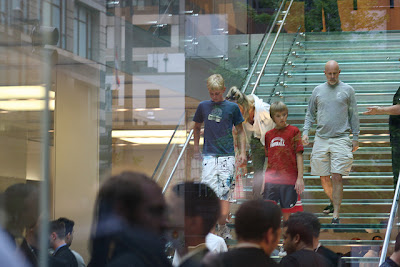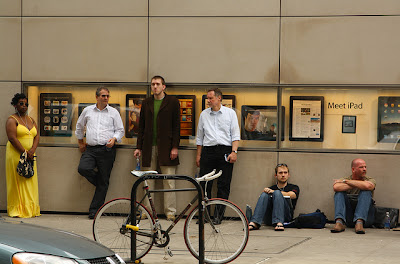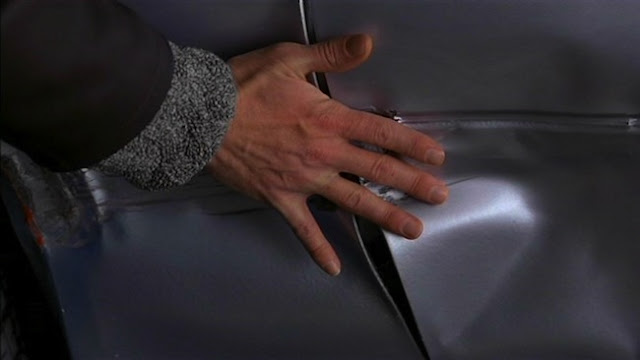At the Apple Store: Fall 2003
Michigan Avenue,
once prized worldwide for its architecture, is prized now by multinationals as
a runway for corporate iconography. Check out the citadels to logo love, the
inflated cartons of corporate faith, behemoths like Niketown, Gap, Disney,
Virgin Megastore, Eddie Bauer, American Girl Store, even the recently truncated
Sony store.
Watching figures eddying along the Boulevard prompts the thought: are we taking more
away than brand identity, retailed cool in an oversized sack? How essential are
brands in and of themselves? The most compelling manifestation may be the new
Apple store. Are its disciples after a sensation of cool or an efficient tool
that happens to be lovingly designed? The Friday night it opened at the end of
June, Mac devotees had been lined up in lawn chairs for a day and a
half—Maccies? On a steaming evening in late August a few days before the
introduction of the super-souped up Apple G5, a different rhythm’s been
established. Outside, it’s over ninety degrees, the doors are wide-open, a/c
and iTunes music blasting out onto the sidewalk like stores in tropical, humid
Hong Kong. The pale cement-paneled façade has only a story-high cutout of the
Apple logo looking onto the store’s second floor. There are oversized graphics
of the inside of the yet-to-be-adopted G5 box, and passersby seem to be walking
inside its very innards.
On
the store’s Huron cross street, horse-drawn carriages queue, up to five at a
time, and from this perspective, like the nearby Museum of Contemporary Art,
the building looks as much like a box computer equipment—or even another
building—might be shipped inside. (It once housed a Gap store.) The circulating
crowds inside, working with a computer platform that boasts only a relatiavely small market share, may see themselves like the buggy drivers, twenty-first century
Luddites, intrigued by the most advanced technology that seems to simplify
one’s work and play. But what about the other possible buyers, who may think Mac seems
too pricey, too precious, too pretentious?
More
than a dozen sales associates circulate among the customers. The place buzzes, constantly. On the ground floor of this two-story sales area, beneath a
Citizen Kane-like
skylight, light floods the airy space, furnished with a chrome and blonde
birds’-eye maple and translucent glass. It would resemble an ooh-and-aww-worthy
San Francisco wine bar if not for all the traffic. There’s the same attentive
glee on the faces of customers and employees, and taking in the entire floor,
you notice that as much if not more than the over seventy computers rigged to
demonstrate different applications and interfaces with different products and
gizmos. The employees stand out from the crowd with their black shirts with a
Terminator sequel-like G5 logo on the back, some wearing Birkenstocks, or khaki
shorts and Adidas without socks. The t-shirts seem the only dress code, which
is also striking. In virtually any other business, even in a head shop or
Abercrombie & Fitch, it seem to be more sartorial rules. Here? The
Apple-flecked t-shirt rules
A day earlier, a PC-native worm on the Internet had slowed traffic worldwide, and Canadian aviation had shut down. There’s a murmur among the aficionados as well as the fascinated walk-ins: do these things get viruses? The fact that they seldom do becomes more than a selling point, but an essential difference. (It could turn out that this viral aspect will make Mac market share leap.)
A day earlier, a PC-native worm on the Internet had slowed traffic worldwide, and Canadian aviation had shut down. There’s a murmur among the aficionados as well as the fascinated walk-ins: do these things get viruses? The fact that they seldom do becomes more than a selling point, but an essential difference. (It could turn out that this viral aspect will make Mac market share leap.)
In
the second-floor auditorium between free demonstrations by employees and
guests, promos loop at the moment; Bono is on the big screen in the back,
clutching an iPod to his chest, praising iTunes. (There’s also a third-floor
training studio upstairs where you can take cheap application-specific
courses.)
More
than loving Mac, it seems the employees love the job, as if it’s an ongoing
conversation all shift long with people who share interests. Gray Rothkopf, the
Service Business Manager, says with a therapeutically reassuring smile that he loves
the work for many reasons, including the fact he’s “a nosy kind of guy,
interested in all kinds of people, learning about them from learning about the
way they use our products.”
 |
| June 2007. |
Scott, tall with
a smudge of a goatee, is greeting customers as they enter. I ask how many
Columbia grads or students he knows at the store, and he tells me “This place
is just filled with Columbia people!” His store gig is usually teaching digital
moviemaking in the private studio classes on the third floor, and intends to return
to Columbia’s TV department. Like most of the employees, he has a colorful and
diverse background beyond computers, including working three years as a
paramedic before finding his way to Apple. It’s part of the company’s interview
process: finding employees who are multiply motivated, who have lives beyond
their laptop. “You don’t want to have to manage people,” Rothkopf says. “The
way not to manage people is to insure that you’ve got quality people to begin
with. Most managers spend 80% of their time managing 20% of their staff, the
ones having problems. Our team? Awesome. Makes your job a lot easier.”
Talking
to the sales associates, their enthusiasm seems less cultish than from genuine
surprise. If it makes you work better, why does happiness with a workplace or a product
have to be such a rarity? One associate told me, “A customer today asked how to
download images from his video camera to his computer. I showed him, and he
said, ‘But there’s a trick, right? Show me how to make it work at home.’ He
couldn’t believe it was that simple. It’s not difficult to demonstrate the
virtues of products like that.”
Along
with the auditorium on the second floor, there’s Apple’s free Internet
section, for customers who just want to drop in and get a fix on one of the
fourteen stations. Here’s where the store seems more like a tourist Mecca, with
Russian, Italian and Polish being spoken by potential customers, the Safari browser pulldown menus
revealing histories in several languages. (Including tracks left by the Italian
visitor interested in “sex” “Chicago” and “stripers.”)
There’s a kid’s
zone, peopled by intent, bright-eyed little gamers with acute posture. Then
there’s the Genius Bar, the largest in any of Apple’s stores, 42 feet long with
almost 20 stools for customers to bring their beefs. A quartet of 16x9 screens
loop tips and quotations, such as “Plato is my friend, Aristotle is my friend,
but my best friend is truth,” by Isaac Newton. And “I do not fear computers. I
fear the lack of them,” attributed to Isaac Asimov. Brushed aluminum nuclei
ring the words “Genius Bar.” It’s essentially a customer service counter, with
the kind of post-jet set décor rife in chic new restos. There’s almost always
someone on duty who knows what the customer’s going to need. “It makes it easier for the customer,”
Scott observes, which seems true in the interactions I observed over several
weeks. You’re routed to a specialist instead of having to describe your
problems like a hypochondriac to a nurse. There’s also an ambiance of quiet
reassurance. It’s like the old retail adage, look busy and people come to you:
they think you’re the one with the expertise.
Problem
diagnoses are free, and eavesdropping on interactions, the therapy metaphor
seems to hold. Scoot, a petite New Orleans native with a wild background,
describes an almost Socratic technique of helping the customer stumble through
the problem, not necessarily letting on how much they know, letting them work
their way through it. “I think that’s how computers are designed,” she says.
“Finding your own path through them.” She laughs. “That may be a little Zen,”
she says.
 |
| June 2007. |
While
the staff is mostly younger, the customers are of all ages and pursuits. A
small, older woman hikes her emerald iMac that matches her linen pantsuit up
onto the sleek counter. A sailor sets a shiny white iBook next to his
starched white cap. A tall cop in sturdy bulletproof asks how to get the Final
Cut Pro upgrade for video editing, even though he still hasn’t taken the old
version out of the shrink-wrap. A kid in a stroller looks up at Dad in awe as
he spews specs to a sales associate. The way that each problem finds its own
Mr. or Ms. Fix-it reminds me of neighborhood hardware stores, where the guy in
the back could tell you how to repair, nail down or grease up anything. Or like
the corner tavern: the way that people trade across the surface of a bar that serves liquor
and life knowledge here is instead necessary bits and bytes of computer know-how.
“People who work on the Genius Bar all have different talents and each person focuses on one thing,” Scott tells me. Most of the sales associates have always been Apple owners, but his employment came from a critical insight. “I was basically waling down Michigan Avenue, and I said to myself, they’re opening a store? They’ll need employees.”
“People who work on the Genius Bar all have different talents and each person focuses on one thing,” Scott tells me. Most of the sales associates have always been Apple owners, but his employment came from a critical insight. “I was basically waling down Michigan Avenue, and I said to myself, they’re opening a store? They’ll need employees.”
Dave finished Columbia's film program in August. (“All finished!” he says, smiling.) He’s
perfecting a cuddly Jesus look, with curly hair and beard, khaki shorts and
Adidas without socks under the black T. “You can just end up talking to a
customer about what matters to both of you. You discover things. People walk in
here, they’re in awe, if they’re PC people, they’re amazed at how different
Macs are, and Mac people find out new applications.” Dave lived in the suburbs,
and came into the city to work on promotional campaigns, mostly for Truth, the
anti-smoking crusade. As a kid, he thought PCs were cool, since all his friends
were gamers with games he couldn’t play. But now that he needs tools, he can’t complain. Apple also gives him
latitude, such as to take an upcoming freelance editing gig coming in
Montreal—he says, “they’re supportive” about letting employees shift schedules.
And the customers? He thinks for a long moment. There are no tales to tell: “I
haven’t seen too many unhappy customers.
“We try to make a solution, the store is about making solutions for people that respond to their needs,” Scott says. “Not every question is about hardware. Some are about very special forms of software or a new application, a new use, that the customer has discovered for themselves.” Still, he continues, “The majority of problems are single answer questions that require expertise, but it’s straightforward.”
“We try to make a solution, the store is about making solutions for people that respond to their needs,” Scott says. “Not every question is about hardware. Some are about very special forms of software or a new application, a new use, that the customer has discovered for themselves.” Still, he continues, “The majority of problems are single answer questions that require expertise, but it’s straightforward.”
Scoot’s
background is anything but straightforward, and seems to be emblematic of an
idealized Mac sales associate or user. She’s wearing two-tone hair, and
flame-licked black bikers boots. She worked for UPN and NBC as a news editor,
doing graphic design as well, trained as a sushi chef, “full-fledged,
fully-trained by Japanese men,” she says. She moved to Chicago two years ago to
do improv, but also had a job in cellular and molecular biology, which she has
her degree in, as well as a stint at a comics store as well. “I did biomed
research for a millisecond, “ she says, but “when even a glimmer of hope to
work at Apple came up, I jumped on it.” I joke, is that because of the
discount? “Honestly, that’s what most of us probably say.” No one’s said that,
actually. “I’ve been here two years. I said if I stayed in Chicago one more
year with the cold and whatnot, being from the South, y’know, Apple would be a
good reason to get out in the cold. It wasn’t science, it wasn’t microcellular
biology that made me stay.”
What
is it about working here? “Being part of something big without losing anything
little,” she says, surprising herself at how readily that answer came. “Music’s
a good example. I use my iPod every single day. I mean, something as big as how
it changed the way I listen to music? Music is huge!” When she was between
jobs, her Mac kept her going, too, cutting wedding videos on her desktop “But
working here, it’s all about the people.” She’s an adept at Final Cut Pro,
loves comics, but she says the Apple store job “allows me to express myself
without being a real artist!"
Marge, a slightly older employee with a background in graphic production, observes that the intense handholding is part of the brand identity. “It doesn’t help us if you’re unhappy.” She likes it best when she can demonstrate products to several customers at once: “It’s great when you have couples or families come in, all the questions get answered at once. Everyone has different questions, and then they don’t have to go home and discuss it.”
Marge, a slightly older employee with a background in graphic production, observes that the intense handholding is part of the brand identity. “It doesn’t help us if you’re unhappy.” She likes it best when she can demonstrate products to several customers at once: “It’s great when you have couples or families come in, all the questions get answered at once. Everyone has different questions, and then they don’t have to go home and discuss it.”
Rothkopf
has a history as a computer entrepreneur, but says that he’s learned immensely
from the few months the store’s been open. “What’s most gratifying about
working with this staff and seeing them work with customers.” There’s a cool
pause. “I think what’s most surprising is the outpouring of love,” he says
without awkwardness. “The people who like Apple, there’s always an enormous
response.” Even when their problems are confusing, “they give us a lot of
leeway.”
Part
of it is a matter of listening. “We ask open-ended questions. We try to
understand how they’re using our computers, it’s a conversation, rather than
just selling something. We learn a lot about a lot of different people. I think
what surprises me most about my job as service manager is that I expected to
have to deal with a lot of angry customers, because that’s the business I’m in,
of ‘the buck stops here.’ I don’t think I’ve run across a customer so far that
I’ve felt like I couldn’t understand where they were coming from.”
[Originally published in a slightly different form in Gravity, a now-defunct magazine published by Columbia College, September 2003. All photographs © Ray Pride.]
 |
| Public, Thessaloniki, Greece, November 2011. |

